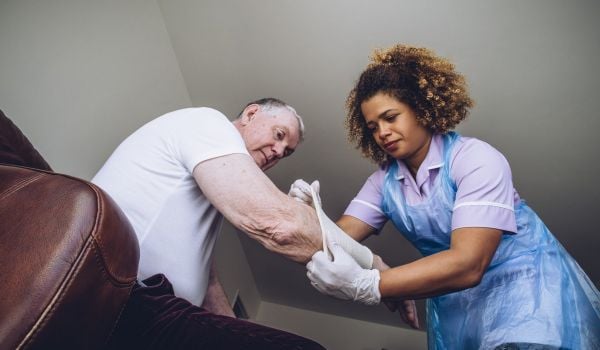Melody McCurtis is an organizer and resident of Milwaukee’s North Side, an area recognized for its “enduring ecosystem of disadvantage.” Over her life, McCurtis has lost over 30 friends to gun violence. And with each death, she noticed something jarring: Victims weren’t taken to St. Joseph Hospital, the North Side’s primary hospital, but rather to Froedtert Hospital, located just outside city limits.
St. Joseph will stabilize a gunshot victim who enters the hospital on their own accord. But Froedtert is the only area hospital designated by the state to hold a level one trauma center, which treats victims transported by ambulances in critical condition. It’s nearly six miles away from McCurtis’ neighborhood of Metcalfe Park. “It’s ironic that the North Side has high gunshot victims, who have 8 to 10 minutes to live [without treatment], and they can’t go to St. Joe’s,” she says.
McCurtis, who organizes with the nonprofit Metcalfe Park Community Bridges, is part of a grassroots push to address what’s viewed as medical redlining in the North Side. Organizers are focused on Ascension St. Joseph — known locally as St. Joe’s — as it’s the primary hospital serving area neighborhoods. After successfully rallying against a service reduction a year ago, the group, which calls itself St. Joe’s Accountability Coalition, is now fighting for care that addresses the area’s health disparities.
Low-income populations across the U.S. have long dealt with stark inequities in health access, quality, safety and outcomes. Quality of life issues in these communities often exacerbate health needs. In the North Side, for example, lead poisoning rates recently ranked six times higher than Flint, Michigan. Alongside this little-publicized health crisis, the area has the highest infant mortality rates in the city.
In 2006, St. Michael’s Hospital closed in the area, leaving St. Joe’s the primary provider in central North Side. The hospital is now owned by Ascension, one of the largest non-profit health systems in the country, which last year announced its plan to close St. Joe’s surgical and medical units, discontinue other services and invite potential partners to provide social and community services in the hospital’s empty space.
The hospital cited financial reasons: With a majority patient base who is on Medicaid, uninsured or under-insured, it lost $31.6 million in 2018.
The proposed cuts inspired a group that included the Citizen Action of Wisconsin, Milwaukee Area Service and Hospitality Workers Organization, Black Leaders Organizing for Communities, African American Roundtable and Wisconsin Federation of Nurses & Health Professionals to collectively organize. “It pushed our union to work with partner organizations … to have meetings, talk with local politicians, and say hey, what can we do about this?” says Nate Gilliam, an organizer with Wisconsin Federation of Nurses & Health Professionals.
These groups saw healthcare cuts as indicative of a larger issue they’ve coined “medical redlining,” as it detrimentally affects low-income, African American communities. Prior to the St. Joe’s announcement, Ascension cut services at Providence Hospital, located in the largely African-American Northeast quadrant of Washington D.C. That hospital officially shut down emergency services last month.
In Milwaukee, organizers worked to educate community members on the impact of service reductions. Those included longer travel times for patients and overburdening hospitals located on the outskirts of the community. They also emphasized that federal law requires nonprofit health providers like Ascension to provide community benefits in exchange for tax exemptions.
At community town halls, Jack Hanson, a research and policy analyst for the Milwaukee Area Service and Hospitality Workers Organization, pointed out that while Ascension lost money at certain hospitals, it had a net profit of $16.8 million for its four facilities across Wisconsin. (He also listed Ascension employee salaries, including the chief executive, who made $17.5 million in 2017 including base salary, bonuses and other compensation.)
The hospital did respond to community concern, deciding not to move forward on planned service consolidations.
Then, over the past year, Ascension held 27 community stakeholder meetings and seven community conversations with over 200 politicians and residents. “We really heard, and listened very deeply, to what the community said about how important the Ascension St. Joseph campus is to the community,” says Reggie Newson, chief advocacy officer of Ascension Wisconsin.
Following that engagement, Ascension announced last month that the hospital will forge partnerships and expand services to better tackle “health beyond healthcare,” as Newson puts it.
As violence prevention was a theme during community engagement, St. Joseph partnered this March with the city’s Office of Violence Prevention on the program 414Life. The program will engage violence interrupters from the community for prevention-based outreach and targeted conflict mediation. Violence interrupters will also support families, friends and survivors of gun violence in the hospital.
Last month, the Milwaukee Health Department opened a Women, Infants and Children outreach office in the Ascension St. Joseph Women’s Outpatient Center. And a partnership with the Hunger Task Force enrolls eligible seniors in a monthly service of free food staples distributed at the hospital. A pilot program is also underway to help patients recovering from opioid overdoses in the emergency department.
But the organizing work is far from done, say members of the St. Joe’s Accountability Coalition. The success of their campaign — plus community feedback gathered during the process calling for greatly improved services — inspired the coalition to push the hospital for more. “The status quo won’t do,” Gilliam says.
The coalition now has three major tenets moving forward: to center an authentic community voice in healthcare needs, to address the racial and gender inequities in the community, and to create a job and training pipeline that results in a local, organized workforce at the hospital.
“Hiring locally can tackle the cultural sensitivity needed [at the hospital],” McCurtis says. “If you hire from the neighborhood, everything starts falling into place.” McCurtis also wants to see St. Joseph take a leadership role in the community’s lead drinking-water crisis as well as on issues like food access.
Ideally, Gilliam adds, the coalition would help establish a formal process to give community members more oversight on their healthcare services.
Newson notes that several members of the St. Joe’s Accountability Coalition were interviewed as part of the community engagement process. The hospital has more initiatives it will roll out soon, he says.
“We’re building a vision around the input we’re hearing from the community, looking to bring resources around the social determinants of health under one roof at the St. Joseph’s campus,” says Newson. “With the coalition, we’re looking to work and partner with any group that wants to improve health equity around the campus.”
To address funding, the hospital is working toward higher Medicaid reimbursements, advocating for more funding in the state budget, and exploring philanthropy and partnership options, according to Newson.
McCurtis hopes any change moving forward will keep the North Side community at its center. “I want to see them really on-the-ground,” she says. “I don’t want them working from the outside in. I want them working from the inside out.”
EDITOR’S NOTE: We’ve corrected the timeline for when Ascension decided not to move forward with the planned service cuts (it was before, not after, the community engagement tour). We’ve also clarified how gunshot victims can be treated at St. Joseph’s.

Emily Nonko is a social justice and solutions-oriented reporter based in Brooklyn, New York. She covers a range of topics for Next City, including arts and culture, housing, movement building and transit.
Follow Emily .(JavaScript must be enabled to view this email address)
















